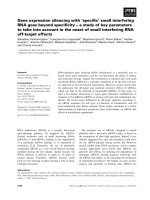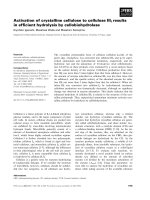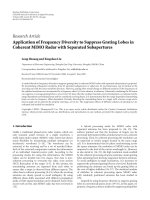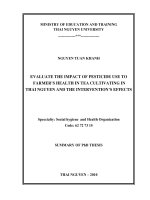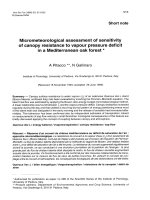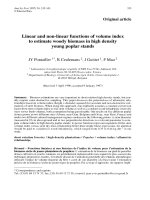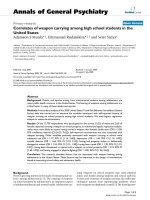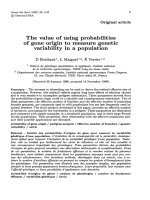The educational managemnt of professional ethics to the teacher students in teacher training colleges in the southeast regions
Bạn đang xem bản rút gọn của tài liệu. Xem và tải ngay bản đầy đủ của tài liệu tại đây (315.09 KB, 28 trang )
MINISTRY OF EDUCATION AND TRAINING
EDUCATION INSTITUTE OF VIETNAM
NGUYEN THANH PHU
MANAGEMENT EDUCATION
TO CONDUCT COLLEGE STUDENTS
PEDAGOGICAL SOUTH EASTERN
Major: MANAGEMENT EDUCATION
Code: 62. 14. 01. 14
DOCTORAL THESIS SUMMARY OF SCIENCE
EDUCATION
Hanoi, 2014
The work was completed in
THE VIETNAM INSTITUTE OF EDUCATIONL SCIENCES
Scientific Supervisor:
1. Assoc. Prof. Dr. Mac Van Trang
2. Dr. Ta Thi Ngoc Thanh
Defender 1:
Assoc. Prof. Dr. Nguyen Van Le
HaNoi National University of Education
Defender 2:
Assoc. Prof. Dr. Tran Thi Minh Hang
Institute of Management Education
Defender 3: Assoc. Prof. Dr. Nguyen Duc Quang
The Vietnam Institute of Educational Sciences
Workplace: The dissertation will be defensed at the Defense Committee
held at The Vietnam Institute of Educational Sciences.
At 2014
The dissertation can be foud at:
- The Vietnam National Library
- Library of The Vietnam Instute of Educational Sciences
SCIENCE WORKS OF AUTHOR
1. Nguyen Thanh Phu (2012), "Ethics Education for teacher students
before renovation requirements and comprehensive basic education",
Journal of Education, Institute of Education Sciences Vietnam-Ministry
of Education and training (Number 84, May 9/2012), pp 31-32
2. Nguyen Thanh Phu (2013), "Situation awareness of professional
ethics of college students Binh Phuoc pedagogy", Journal of Science
Education, Institute of Education Sciences Vietnam-The Ministry of
Education and training (No. 98, May 12/2013), pp 52-53
3. Nguyen Thanh Phu (2014), "Managing ethics education for college
students of the Southeast pedagogy", Journal of Educational
Administration, Institute of management education and the Ministry of
Education and training (No. 65, May 10/2014), pp 50-53
1
INTRODUCTION
1. Retionale for the study.
1.1. The ethical standard of profession has recently been identified and
concretized with principles, regulations and professional standards. The
objectives of pedagogy are human beings and the process of setting up the youn
generation’s manner in the expectation of the society. Ho Chi Minh used to tell
all teachers that: “Teacher’s duty is very hard, but it is very glorious”. Teacher
must be always good samples, keeps improving the ethical revolution and has
got a steady stance of politics” [108, P. 614- 616]. The Party and state always
appreciate teacher’s role which is considered as a key component for deciding
the process of the fundamental and entire innovation of the state’s education.
The resolution of the central government 2, section XIII affirmed: “Techer is a
decisive factor of educational quality and respected by the whole society”.
Therefore, teacher must always maintain his/her good quality, prestige and
reputation, respect learners, treats learners equally, defends learners’ legitimate
rights and interests, keeps learning and training to improve ethical standards,
political knowledge and professional skills, innovates teaching methods and set a
good examples for learners” [The constitution in 1992]. According to the
educational law, teacher must have the following standards: “ethical quality,
good thought, professional standards and skills, and good health and
background”. (The educational law, 2005). In reality, the teacher’s and
pedagogical students’ ethical profession of pedagogy in some universities and
colleages of educartion are still inadequate. It is high time to hance education of
ethical profession for students studying at colleges of education.
1.2. Theoretically, there have been a number of routes and methods to raise the
quality of ethically educational profession for students who have studied in
colleges of education. One of them is to boost the manement of ethcially
educational prefession for students. The management of ethically educational
prefession for students has a significant role in developing students’ manner,
called “The engineer of sprit”, in colleges of education. The rectors of colleges
of education play a leading role in managing the education of ethical prefession.
From the aforementioned practical reasons as well as education science, I choose
“ The educational management of ethical prefession for students in the
colleges of education in the South- East provinces” as a doctoral thesis to
provide the Universities with the innovation of educational management.
1. Aims of the study
Based on the theoretical and practical foundations, I propose some solutions to
innovate and enhance the education of ethical profession for students in the
colleges of education.
2
2. Objectives and targets of the study
2.1. Objectives of the study
The process of schooling students in the ethical profession in the colleges of
education.
2.2. Targets of the study
-Measures of the educational management of ethical profession for students in
the colleges of education.
3. Scientific assumptions
-The documents and the practical management of education reveal that the
education of ethical prefession for students in the colleges of education plays a
significant role in training teachers. However, the result of schooling students in
the ethical profession in the colleges of education has been limitted due to many
affecting factors, namely, the educational management of the ethical profession
for students in the colleges of education.
-There will be a satisfactory result of educational management of ethical
profession for students if the educational management of ethical profession for
students is implemented synchronously, and appropriate with the practical
training of the colleges. Of many measures, the effective improvement and
management of teaching practice are said to be possitive in schooling students
in ethical profession in the colleges of education .
4. Tasks and scope of the study
4.1 Tasks of the study
4.1.1. Reaserching the literature review on the educational management of
ethical profession for students in the colleges of education.
4.1.2. Assessing the situation on the educational management of ethical
profession for students in the colleges of education.
4.1.3. Proposing measures on the educational management of ethical profession
in the colleges of education in order to enhance the results of the educational
management of ethical prefession for students in the colleges of education.
4.1.4. Evaluating and experimenting the proposed measures to indicate their
importance as well as necessities.
4.2. Scope of the study
-The study is restricted in the scope of the educational management of ethical
profession for students in the colleges of education.
-The situation of the study is assessed through the investigation and survey from
the managers, teachers and students in three colleges of education in the
Southeast provinces (Binh Phuoc, Tay Ninh, and Vung Tau).
3
-The study focuses on the teaching practice in Binh Phuoc college of education.
5. Methodology
5.1. Theory: We research materials related to the educational management of
pedagigical ethical profession in order to generalize theories, scientic views and
to set up the foundation on the educational management of ethical prefession for
pedagogical students.
5.2. Practical investigation: The study is investigated by questionaires,
interviews and discussions for managers, teachers and students in three colleges
of education.
5.3. Experiential summary: We analyze the managers’ and teachers’ experiential
reports in the pedagogical colleges.
5.4. Expert consultation: We consult the ideas of the educational and training
managers and attend workshops ralated to students’ ethical profession.
5.5. Statistical analysis: We draw on the statistical method to process the data
through setting up the data table, to caculate distinctive paremeters (Sample
mean, arithmetic mean, variance, avarage deviation, T-test, coefficient of
correlation)
6. Counter- arguments
6.1. Students should build up their own manner becuase people are the subjects
of activites, “ but in fact, humans are the synthesis between social relations
(K.Marx). Therefore, in order to improve educational efficiency of ethical
profession in the process of schooling students, the management must create a
unified collaboration, synchronic activities among the educational forces and
environment at both micro and macro levels. However, the educational
management in the schools must always play a main and decisive role.
6.2. In order to achieve good results, the educational management of ethical
profession for pedagogical students must have concrete and appropriate
measures with each college. Setting up the measures of the educational
management of ethical prefession in the pedagogical colleges must derive from
each school’s targets and requirements, especially it must be tied to the direction
of basi and entire innovation of Vietnam’s education at the current phase.
6.3. The educational management in general and the educational management of
ethical profession in particular, play an ensuring role in the development of
personality in the right direction to meet the requirements of industrialization and
modernization and international integration of Vietnam.
7. Significance of the study
-Clarifying the notion of pedagogical ethical profession, the theory of the
educational management for pedagogical students in the colleges, the
significance of the educational management of ethical profession, and the role of
4
the educational management of ethical profession for students in the pedagogical
colleges; identifying effect factors on the educational management of ethical
profession for pedagogical students at the moment.
- Evaluating the situation of students’ ethical profession in the pedagogical
colleges and the educational management of students’ ethical profession in the
pedagogical colleges in the southeast provinces, finding out causes for these
situations.
-Propsosing some management measures of pedagogical ethical profession for
students so as to create an unification in the educational management of ethical
profession for students. The result of improvement of teaching practice
management in the pedagogical colleges reveals that enhancing ethical
profession for students is reliable and is applied in the pedagogical colleges.
-Hoping that the theisis will be a useful reference book for managers, teachers
and students , it is also scientific foundation for setting forward new policies
and mahenism for the educational management of ethical profession for
students.
Chapter 1: THE LITERATURE REVIEW ON THE EDUCATIONAL
MANAGEMENT OF ETHICAL PROFESSION FOR STUDENTS IN
THE PEDAGOGICAL COLLEGES.
1.1. Overall histoty of the study
1.1.1. Study on EP and PEP
Professional actions is the typical measure for humans to exist, therefore, ethical
profession is an important part of social conduct. To exist, humans must work,
and in order to get a good result, humans must obey ethical profession.
Ehical profession is an indispensable requirement of any type of job. Every
profession has specific requirements of ethical profession and distinct ethical
standards.
International Federation of Journalists (IFJ) put forward the regulations of ethical
profession at the congress of International Federation of Journalists, held in
Bordeaux- France, April 1954.
International Federation of Library Association (IFLA) issued the regulations of
ethical profession which are considered as conduct-oriented recommendations
for librarians.
The regulations of American Consultation Association (ACA) put forward 5
typical aims for ethical profession.
The International Federation of Count Association (IFCA) decodes 5 necessary
targets for all professional accounts.
5
The regulations of professional ethical standard are currently issued in Vietnam,
including:
-Medicine: the minister of health issued “ The regulations of ethical medicine,
No 2088/BYT-QĐ” on November 6
th
1996.
-Journalists: The eigth congress of Vietnam Journalist Asociation ratified 9
articles of ethical profession for Vietnamese Journalists.
-Business: The slogan “ Customers are Gods” or “ Welcome customers to come,
Please customers when they leave”
-Accountant: The ministry of finance issued the standards of ethical profession
(No 87/2005/QĐ-BTC) for Vietnamese accountants and auditors.
-Court: The people’s court issued 10 rules on behavior for officials in the
people’s courts.
-The minister of culture, sports and tourism issued rules on behavior (No
61/2008/QĐ-BVHTTDL, July 31
st
2008)
-Pedagogical ethical profession has been valued in every country. The
regulations of ethical profession are set up for teaching career in Victoria,
Australia.
-Pedagogical ethical profession in Vietnam has a long history and has been
valued. Ho Chi Minh used to consider conduct as the foundation for
revolutionary people, as teacher’s spirit. Therefore, he used to recommend that
“teacher’s morality create students’ morality, and teacher must be good samples
for students ” [79, p.492]
Nguyen Canh Toan said that improving the quality of teacher training must
require a comprehensive training process of both virtue and pedagogical
capacity, preserve and promote the tradition " respect teacher and honour
teaching career"
Nguyen Ke Hao said: the personal qualities of the teacher should contain a factor
of "ethical lifestyle" which introduces the concept of "ethical profession"
Nguyen Ngoc Bao said that in training teachers, ideological education and
politics, professional ideals, the moral quality must be valued highly.
Generally speaking, authors appreciate the role of ethical profession in teacher’s
manner and indicate the importance of ethical profession in teacher training.
1.1.2. Study on ethical education of profession
J.A.Cômenxki (1592 - 1670), an Czech great teacher, set up many valuable
premises for educational development and left 250 valuable works of culture and
arts, science, literature, especially education.
6
Lenin said that: “ teacher must integrate in the people’s lives, teacher’s activities
must be implemented under requirements of the socialist society” [70, p.222].
Professor Zhang Lanying, Dezhou University in China, his research on moral
education in colleges in the new period analyzed dominant functions and
orientations of moral education in educating people [69 ].
Edward J. Caropreso of University of North Carolina in Wilmington and Aaron
W.Weese in Charlotte- Mecklenberg School, in their research of moral
education: Lessons for teacher preparation programs, generalized as follow: the
role of "moral education" is the process of teaching, learning and ethical
practices in education. Their writings set forward the need for moral education
and provided a framework program in which pedagogical students are expected
to school in moral education.
The International Institute on Educational Planning proclaimed the work of
Morality in education: the role of educational law indicating that there are 3
ways in which teacher can improve their qualities in order to become "good":
through perceptional quality , ethical profession, and professional freedom.
Moral education in Vietnam has been researched:
-Investigating the trend of students’ personal manner by the board of educational
and psychological management of the institute of university Research and
Professional Education (1987-1988).
-Setting up lifestyle and morality for pedagogical college students who will
serve the state’s process of industrialization and modernization (code QG /
96/08, Nguyen Quang Uổn).
- Workshop: "The educational orientation on the moral values in Universities",
(Ministry of Education and Training (10/1996).
-Students’ curent lifestyles and orientations and educational measures on
lifestyles for students (Ministry project, code B94 - 38-32 by Mac Van Trang ).
- Pham Minh Hac dedicated the third chapter to mention the teachers in the book
of “Psychology”.
- Ha Nhat Thang summarized his research on the moral values of the
Vietnamese religions.Tac Tran Quoc Thanh said " The moral and lifestyle
education play an important role In higher education, along with equipping
students with an advanced education "[54, p.19].
- Nguyen Huu Long studied the structure on "teaching ethics"and proposed the
program of "Introduction to pedagogy” which was applied in the first week of
the first year year [54, tr.155].
- According to Nguyen Dinh Chinh, "professional ideal plays a very important
role, is considered as the kernel in the pedagogical personality" and the role of
teaching practice must be especially valued.
7
1.1.3. Study on the educational management of pedagogical ethical profession
In Canada and South Asia countries have had the research programs on moral
education for teachers by setting up teacher law.
In the state of Victoria, Australia, the managers gave the regulations on ethical
pedagogy.
Pham Đo Nhat asserted that most of countries have law or regulations on ethical
profession in their education.
In Vietnam, the educational management of ethical profession for students
derived from the Party and State’s view.
Bui Minh Hien- Vu Ngoc Hai- Đang Quoc Bao affirmed that teacher plays a
important role for success of failure of education, therefore, teacher must gain
the satndard on teacher’s morality.
Bui Van Hue said that the pedagogical colleges not only school students in
fundamental and pedagogical science but also train students good manner and
professsional orientation ”[52, p.2-3].
The study of the educational management of ethical profession are also
presented in some doctoral thesises:
-Thesis: The educational measures of ethical profession for pedagogical students
in the market economy in Vietnam-Nguyen Anh Tuan, 2008
-Thesis: “ Bulding up a model of educational ethical management in the current
period” Nguyen Thi Hoang Anh- 2008.
- However, until now there have not been any full and practical research on the
system of educational ethical management for pedagogical students in the
colleges in the current period.
1.2. Theory on education of pedagogical ethical profession
1.2.1. The notion on ethics and ethical education
- Ethics: Ethics is a form of social consciousness which particularly includes a
system of concepts, rules, social norms. It was born, servived and transformed
from the needs of society, whereby people adjust their behavior to suit their
interests and happiness and the progress of society in relation between humans
and humans, between the individual and society.
-Ethical education: ethical education with purposeful, planned and organized
activities of teachers in the educational units affect students in order to transfer
the needs, standards , moral values at the request of the society into individual
qualities, values, ethical behavior, to contribute to the development of the
individual personality, and to promote the development and advancement of
society.
8
1.2.2. The notion on ethical profession and pedagogical ethical profession
- Occupation: Occupation is humans’ professional activity who are trained in
the knowledge, skills, educational ethical profession to help them do a regular
job to live and contribute to the development of society. Occupation not only
ensures life but also honor people working in that field .
- Moral profession: Moral profession is a system of moral standards reflecting
the demanding requirements of society, the profession itself to people working in
the field, and is fundamental factor to help them fulfill their mission. Moral
profession always shows off workers’ perceptions, attitudes, behaviors and the
teacher’s working results of pedagogy.
-Pedagogical ethical profession: Pedagogical ethical profession is a system of
moral standards reflecting the demanding requirements of society, the profession
itself topedagogical workers; is a fundamental element to help them fulfill their
mission. Pedagogical ethical professional always show off in awareness,
attitudes and behavior of workers and and the teacher’s working results of
pedagogy.
1.2.3. The notion on pedagogical ethical profession
Educational ethical profession is apurposeful, organized, planned actitity to turn
the teacher’s ethical standards reflecting the demanding requirements of the
society, the profession itself to pedagogical workers into categories and right
behavior to full their mision.
1.2.4. Requirements to educational ethical profession for students
According to professional standards of secondary education : (Circular No.
30/2009 / TT-BGDDT, issued on October 22, 2009 by the Minister of
Education and Training), and the request from the training objectives of the
pedagogical colleges
1.2.5. The process of the foundation and development of PEP
- Through the teaching of academic courses
- By pedagogical practical activities
- Through outdoor and group activities
- Through the self-training of students
1.2.6. Psychological features of students for setting up PEP
To get good results, the education of ethical profession must be appropriate with
students’ features that include
- The development of awareness, intelligence and learning motivation
-Students’ lives and affection
-Self- evaluation and self-education of students
9
-The development of students’ valuable orientation
1.3. Arguments on the educational management of PEP
1.3.1. The notion on the management of moral education
-The notion on educational management: The educational management is a
process of concious impact of the management subjects (purposeful and
organized) on objects and the implementation of management fucntions which
aim at putting forward the pedagogical activities of the educational system in
order to achieve set targets.
-The notion on the management of moral education: the management of
moral education is a concious impact of the subjects on the objects aiming at
putting forward activities of moral education in order to achieve the set targets.
1.3.2. The educational management of ethical profession for pedagogical
students.
-The educational management of ethical profession for pedagogical students is a
concious impact of the subjects on the objects through suitable measures aiming
at putting forward educational activities of ethical profession for pedagogical
students for achieving the set targets.
-On perspective of the activities of management: The educational
management of ethical profession for pedagogical students include:
1. Concretizing the educational targets of ethical profession for pedagogical
students.
2. Planning the education of ethical profession for pedagogical students
3. Organizing the education of ethical profession for pedagogical students
4. Guiding organizations and activities implemented under functions.
5. Controlling and evaluating the result of the education of ethical profession for
pedagogical students
1.3.3. The factors affecting the educational management of ethical profession
for pedagogical students
-The leaders, teachers and students’ awareness on the education of ethical
profession for pedagogical students.
- The leaders, teachers and students’ the attitudes toward the education of
ethical profession for pedagogical students.
-The pedagogical enviroment of school
-Facilities for education of ethical profession for pedagogical students.
-The conditions of politics, economy, society at local regions
10
THE CONCLUSION OF CHAPTER 1
The result of the study has determined: ethical profession is a system of
moral standards reflecting the requirements of the society and the profession
itself for people working in the areas, and a fundamental factor helping them
have right awareness, attitudes and behaviro to complete their duties excellently.
Ethical profession of pedagogy is a system of moral standards reflecting the
requirements of the society and the profession itself for teachers, and
fundamental factor helping them to complete their duties. Ethical profession of
pedagogy always shows off teacher’s awareness, attitudes and behavior, and the
result of teacher’s work.
The result of the education of ethical profession in schools is dependent
on the educational management of ethical profession. The educational
management of ethical education for pedagogical students is a concious impact
of the subject of management on the object of management with suitable
measures to put forward educational activities of ethical profession for students,
and achieve an expected result. Thereby, we can determine the activities of
educational management on ehtical profession for pedagogical students, and
factor affecting the activities of the educational management on ethical
profession for pedagogical students.
THE MAP OF THE THEORRETICAL FRAMEWORK FOR
EDUCATIONAL MANAGEMENT OF ETHICAL PROFESSION FOR
STUDENTS
RECTOR
Manageme
nt activities
of PEP
Conretizing
targets
Planning
Organizing
educational
forrces
Controlling
activities
Objectives
Standars of PEP for students
(a, b, c, d, e, g, h, i, t)
Affecting
factors
on
educatio
nal
manage
ment of
PEP for
students
Pedagogical
environment
Facilities and
equipment
Awareness of
M, T, S on PEP
Attitudes of T
and
Checkimg and
evaluating
Politics,
economy,
11
CHAPTER 2
THE SITUATIONS OF EDUCATIONAL MANAGEMENT OF
ETHICAL PROFESSION FOR PEDAGOGICAL COLLEGE
STUDENTS IN SOUTHEAST PROVINCES
2.1. Overal features of the pedagogical colleges in Southeast provinces
2.2. Surveys on the stituations
2.1.1. Targets for the surveys:
- To assess the current reality of the educational management of PEP for in the
southeast colleges.
- To determine the factual basis for the formulating the educational management
measures of PEP for students.
2.1.2. The content of the survey.
-The current reality of students’ ethical profession
-The current reality of the education management of ethical profession for
students.
-Affecting factors on the education of ethical profession for students.
2.1.3. The object of the survet:
- Ba ria- vung tau college of education, Tay Ninh college of education and Binh
Phuoc college of education.
- 320 second-year students
- 90 lecturers
-30 cadres of Youth union
-10 leaders of the colleges
-Other social forces 20
2.1.4. The method of the survey: The methods of investigation and survey are
used to determine the amount by questionaires, and the methods of interview,
seminar, observation, attending scientiic workshops to determine the quality of
the facts.
2.3. The current facts of students’ ethical profession in colleges of education.
2.3.1. The facts of overal awareness on students’ standards of ethical
profession
Figure 2.1.1: The facts of overal awareness on students’ standards of ethical
profession
Levels
Very
necessary
Necessary Unnecessary
Order Standard and quality
Stud
ents
Edu
forces
Stude
nts
Edu
forces
Stude
nts
Edu
forces
1 With socialist ideal 49,2
69,2 46,7 30.8 4,2 0
2
With professional
belief
55 57 42,9 43 2,1 0
3 With good morality 84,2
89 15,4 11 0,4 0
12
4
With love for job
and children
73,3
81 25,8 19 0,8 0
5
With good
knowledge
81,3
86 18,3 14 0,4 0
From the figure above, we see that the following standards which are appreciated
by students and educational forces and considered to be very necessary for
teachers:
-Good quality of morality: 84,2-89% ( first rank)
-Good knowledge of profession: 81,3%- 86% ( second rank)
-Love for job and children: 73,3-81% (third rank)
The result ascerts that the good quality of ethical profession, professional
knowledge and love for job and children are the most important standards for
teachers. The fundamental standards of ethical profession ask students not to
stop training to become good teachers- educators, to set up and enhance the
personal manner of moral and smart generations who are responsible for
constructing and protecting the nation, and to satisfy the expectation of the
society. These are distinctive and indispensible standards of ethical profession
for students to complete their duties.
2.3.2. The facts of students’ attitudes forward morality and ethical
profession
Figure 2.1.2: The facts of students’ attitudes forward morality and ethical
profession
Levels
Order
Views
Strongly
agree
Agree Disagree No idea
1 Strong love for
job
15,5 64,3 3,5 16,7
2 Love for job 13,5 60 9,5 17
3 No love for job 4,6 30,4 40 25
4 No idea 7,5 12,6 36,7 43,2
Commnets: Students having love for job make up the highest rate 64,3%, this is
a good sign and students determine their first right motivation for sitting for
pedagogical colleges. This has a good benefit of moral profession for students,
boost them to study, and help students have love for job and belief in their
chosen jobs. Just 3,5% students have no love for job, so colleges’ educational
measures must be practical and necessary in traing process to achieve good
results.
Love for job and children is a foundation and favorable condition helping
students overcome dificulties, challenges and beliefs in their chosen jobs.
2.3.3. The facts of students’ behavior of ethical profession
Figure 2.1.3: The facts of students’ behavior of ethical profession
13
Evaluation
Good performance Bad performance
Majority
(over 70% )
Minority
(under 30%)
Majority(
over 70%)
Minority (Under
30% )
Stu
Edu
F
ST Edu F
Stu
Edu
F
Stu Edu F
O
R
Behavio
r
A
m
%
S
L
%
SL
%
S
L
%
S
L
%
S
L
%
S
L
%
SL
%
1
Main
coursess
16
6
52,
2
79
52
.6
13
7
43
69
46
3
0,
9
1
0,
6
12
3,7
1
0,6
2
Regulati
on
excutio
n
99
31,
9
82
54
,6
97
30,
5
32
21,
3
66
20
,7
21
14
56
17,
6
15
10
3
Helping
people
14
4
45,
2
76
50
,6
15
6
49
64
42,
6
9
2,
8
5
3,
3
10
3,1
4
3,3
4
Self-
edu
EP
17
2
54,
0
87
58
11
5
36
58
38,
6
12
3,
7
0
0
19
5,9
5
3,3
5
Outdoor
activitie
s
For
EP
10
5
33,
0
57
38
15
3
48
67
44,
6
30
9,
4
16
10
,6
30
9,4
10
6,6
Comments: Students’ current behavior is not really good and high. Students
have not followed schools’ regulations, and have been indefferent to charity and
outdoor activites for training ethical profession. The good behavior including
main courses and professional improvement makes up 52,2-62,6%.
2.4. The facts of education of ethical profession for pedagogical students
2.4.1. Awareness on educational objectives of ethical profession for PS
Figure 2.1.4: awareness on educational objectives of ethical profession for PS
Importance ( %)
First Second Third
SV LL GD
SV LL GD
SV LL GD
Target
SL
%
SL
%
SL
%
SL
%
SL
%
SL
%
1
Loving and
tying to job
243
76,0
121
80,7
64
20
24
16
12
4 4 3,3
2
Maintaining
teacher’s
quality,
reputation,
prestige,
218
68,2
109
73,3
92
29
37
24,7
8
2,8
1 1,3
14
3
Respecting
and having
fair treament
to students
251
78,5
111
74
62
19,5
37
25,3
6
2 1 0,7
4
Desiring for
learning and
improvement
78
24,6
28
19,3
195
61
96
64
46
14,4
25 16,7
5
Living
honestly and
healthily
83
26,0
28
19,3
150
47
100
66,7
86
27
21 14
Comments: educational objectives of ethical education with the highest
evaluation include: love for job (76-80,7%); respectation and equal treat to
students: (78,5%-79%), preservation of teacher’s quality, honour and prestige:
(68,2%-73,3%).
2.4.2. The facts of collaberation of forces in education of ethical profession
for students
Figure 2.1.5: School’s collaberation with other forces in in education of ethical
profession for students
Evaluation ( %)
Collaboration The most important
TT Typical educational forces
Stu
Edu
F
Stu
Edu
F
1 HCM union Youth 65 70,7 61 46
2 Class- management teacher
61 65,3 60 53,3
3
Department of student’s
management
11 15,3 17 5,3
4 School Union 51 62 62,2 50,7
5 Local security 37 48 39 20,7
The collaberation of the forces participating in the education of ethical
profession for students is typically the units in the colleges: HCM Youth union
(65-70,7%) and class-management teacher ( 61-65%). These forces play the
most imortant role.
Figure 2.1.6: The facts of collaberation between school and family.
Evaluation (%)
BP CE
BR-VT
CE
TN CE Overall assessment
TT
Exchange
categories
Stu
Edu
F
Stu
Edu
F
Stu
Ed
u
Stu
Edu
F
15
F
1
Class-
management
teacher
44 51 42 41
42,
8
45,
2
42,
9
45,7
2 Youth Union
17 11 10 9,8
10,
2
9,8
12,
4
10,2
3 Email/ letter 11,3
7 10 9 9 11
10,
1
9
4 Telephone 87 78 80 78 81 78
82.
6
78
5 The internet 35 34 26 29 25 29
28,
6
30,6
6 Meeting 80 78 71 79 75 81
75,
3
79,3
Comments: The results show that parents often exchange directly with their
children ( 75,3-79,3%); through homeroom teachers (42,9-45,7%). This is the
fact that the relationship between parents and students are often established as a
liaison to grasp the situation of students and their families. Some forms of
exchange are not appreciated : mails (10,1-9%), the leader of residence (8,6-
7,6%), deans (7,5-9%). Thereby, schools and families should have a relationship
through basic bridges; homeroom teacher plays a role of necessary link between
schools and family to exchange and receive information the most effectively.
2.4.3. Evaluation of the levels of students’ mistakes in the process of
professional ethical education in pedagogical colleges.
Figure 2.1.7: Evaluation of the levels of students’ mistakes in the process of
professional ethical education in pedagogical colleges.
Levels TT
Mistake levels
Many
Few No
1
Cheating in examination
10,05%
80,28%
9,67%
2 Time violence
6,5% 68% 25,5%
3
Altercation and fighting with
friends
10% 77,5% 12,5%
4 Bad treat to teacher 0,00 70.5% 29,5%
5 Law and conscience violence
0,00 71,5 28,5%
Comments: Mistakes which students often make most are cheating in
examinations (10,5%), altercation and fighting with friends (10%). Serious
mistakes make up low rate: Bad treat to teacher and managers ,and Law and
conscience violence.
16
2.5. The facts on management activities of ethical profession for students in
pedagogical colleges.
2.5.1. The facts on the content of educational management of ethical
profession for students of pedagogical colleges.
Figure 2.1.8: The facts on the content of educational management of ethical
profession for students
Educational managers’s evaluation (%)
Order
Contents
Good
Fair
Avergag
e
Weak
1
Setting up
management plans
9 11 57 23
2 Carrying out plans 5 7 69 19
3 Directing plans 6 8 71 15
4 Evaluating plans 2 7 75 16
2.5.2. The facts on setting up plans of the educational management of
ethical profession
Figure 2.1.9: The facts on setting up plans of the educational management of
ethical profession
Level %
Good Averaage
Weak
Order
Plans
Amount
% Amo
% Amo
%
1 Annual plan 126 84 93 62 85 57
2 Termly plan 90 60 81 54 54 36
3 Monthly plan 73 49 75 50 57 38
4 Weekly plan 73 49 46 31 87 58
5 Set-up plan 70 47 76 51 42 28
6 Unexpected plan 63 42 97 65 49 33
2.5.3. The facts on the educational organization of ethical profession for
pedagogical students
Figure 2.10: The facts on the educational organization of ethical profession for
pedagogical students
Evaluating educational managers
Completed High result
Order
Educati
onal activities of ethical
profession for students
amo % amo
%
1 Direction through sections 110 73,8 57 38
2 Direction through lecturers 116 77,5 54 36
3
Direction through youth union
and student asociation
97 65 52 35
17
4
Direction through Arts and
festivals
105 70,4 44 29,6
5
Direction through professional
practice
71 47,5 33 22,5
Comments: many organizational forms of education of ethical profession for
students which are directed to assess are applied widely but have not achieved
high results. They are implemented through: One week of civic education, yearly
teaching practice and lecturers about Marxism and Ho Chi Minh’s thought.
2.5.4. The facts on direction of coordination for implementing plans
Figure 2.11. Directing the coordination of educational forces of ethical
profession for students
Order
Content of coordination Good (%) Not good (%)
1
Mobilization and coordination of full
attendance
62 38
2
Direction of coordination of students’
implementing activities
75 25
3
Direction of coordination of
pedagogical community’s
implementing activities
80 20
4
Direction of coordination between
School- Family- Society
52 48
5
Direction of coordination between
organizations and pedagogical
community
84 16
Comments: The direction of education of ethical profession for students in
pedagogical colleges has a fairly good coordination. It has clear direction and
assignment for organizations and teaching staffs. In addition, there are still
limitations: the coordination between pedagogical community and student
association; family – school- society.
2.5.5. The facts on the educational management of ethical profession for
students in pedagogical colleges.
Figure 2.12: . The facts on the educational management of ethical profession for
students
Managers’ evaluation
Good
Fair Average
Weak
Order
Measures
SL
% SL
% SL
% SL
%
1
Enhancing awareness of ethical
profession (EP)
42
28 78
52 22
15 7 5
18
2 Planning the education of EP 18
12,1
85
56,7
43
28,7
3 2,5
3 Implementing 24
16 78
52 45
30 3 2
4
Prescribing students’ of self-
management
29
19,6
79
53,3
38
25,4
2 1,7
5 Improving evaluation 32
21,7
73
48,8
39
26,3
4 3,3
Comments: The educational measures of ethical profession which are applied the
most frequently such as enhancing teacher’s and students’ awareness and
responsibility on ethical profession through subjects and the organization of the
emulating movements. The measures which are applied least such as discussion
on ethical profession and education by make good samples.
2.5.6. The facts on testing and evaluating the implementation of ethical
profession.
Figure2.13. Evaluating rates of stutdents’ training results in pedagogical
colleges.
Educational managers’ evaluation
Good Not good
Order Contents of evaluation
amo % Amo
%
1 Regular evaluation 121 81 28 19
2 Termly evaluation 150 100 0 0
3 Academic year evaluation 150 100 0 0
4 Clear criteria of evaluation 94 63 55 37
5
Multi-
field, subjectivie and
impartial evaluation
112 75 37 25
Comments: the regular evaluation of ethical profession of ethical profession for
students: the coordination of self-evaluation of teacher, students, homeroom
teachers, deans and schools. On limitation, there are not clear criteria on PEP to
determine equality and accuracy
2.6. Affecting factors
Figure 2.14: Causes of limitation of the educational management of ethical
profession for studdents
order
Causes
Ideas
(%)
Ranked
1 Negative impacts of economy – politics- society 64.5 9
2 Enviroment of pedagogical culture 87,0 3
3 Awareness on the education of ethical profession 87,5 1
4 Effect of attitudes and behavior 66,5 8
5 Current facilities of the school 74,25 7
Comments: *The group of subjetive causes: awareness on importance of
teacher’s and manager’s education of ethical profession for pedagogical students
19
has been limited. The results of research methods of practical summary,
interview and group discussion show that attitudes and awareness of the
educational managers of ethical profession for students has been limited leading
to the inappropriateness of training ethical profession in pedagogical practice.
*The group of objective causes: the effects of economic regression of the
world and impacts of markets, pedagogical enviroment and facilites reduce the
results of the education of ethical profession for students.
2.7. Overall evaluation of the the educational management of ethical
profession for pedagogical students.
2.7.1. Strong points: Managers and teacher of the school are aware of roles
and positions of the educational management of ethical profession. The
managers try to find out appropriate measures in the education of ethical
profession for students.
2.7.2. Weak points: teacher still does not have obvious awareness on the
importance of the education of ethical profession for students, and the
implementation is still passive. In addtion, the school is inclined to profession
training, but defies the education of ethical profession. The combination of
teacher’s teaching operation with the education of ethical profession for students
has been imperfect; the direction of teaching practice has been inappropriate and
the coordination of units in the school has not been synchronical. The condition
of facilities and finance has been limited, and the coordination of the school and
family is not good.
CONCLUSION OF CHAPTER 2
The result of the survey shows that students have obvious awareness of moral
quality and standards, respect for other people, and personal quality. About
attitudes, the concept of the student retains the respect for teachers and personal
manner. About behavior, students have a good focus on positive activites,
namely the movement of arts, sports and hard working Some other matters,
students still have vague awareness, indifferent attitudes and bad behavior.
The facts of students’ ethical profession show that pedagogical students are
appreciated about professional values as: love and respect for students; honor to
the society, and keeness on working for those values. However, some students
have unclear ideals and beliefs, low awarenss of regualtions, and indifferent
attitudes traditional history of the nation.
The facts of the educational management of ethical profession for students show
that the school has concrete aims to educate and train students to become
teachers with competence and quality of ethical profession, a suitable process of
management including: plan-organization- direction- inspectation. However, the
educational maanagement of ethical profession is inclined to forms, the
coordination of the educational units is loose, the direction and inspectation of
the education of ethical profession for students lack determination and
unsynchronicity.
20
In addition, affecting factors on the education of ethical profession for
pedagogical students derive from awareness, pedagogical enviroment, facitlites
and politics-economy- society. Thereby, we need to have an appropriate
education of ethical profession for pedagogical students.
CHAPTER 3
MEASURES OF THE EDUCATIONAL MANAGEMENT OF
ETHICAL PROFESSION FOR PEDAGOGICAL STUDENTS AND
EXPERIMENTAL RESULTS
3.1. Constructive principles of the educational management of ethical
profession for students in pedagogical colleges include: to ensure logicality,
practicality, inheritance and feasibility
3.2. Measures of the educational management of ethical profession for
pedagogical students
3.2.1. Measure 1: Enhance teacher’s and students’ awareness on the
importance of PEP and its position in pedagogical colleges.
3.2.2. Measure 2: Plan the content of the education of ethical profession to
ensure the implemetation of objectives and the training content
3.2.3: Measure 3: Analyze roles, duties and power of homeroom teacher in
the education of ethical profession for pedagogical students.
3.2.4. Measure 4: Direct the education of ethical profession forward
integration and combination of indoor activities with outdoor ones.
3.2.5. Measure 5: Improve management and teaching practice to enhance the
effect of the education of ethical profession for pedagogical students
3.2.6: Measure 6: Enhance the supervision, inspection and evaluation under
the criteria of practice of students’ ethical profession.
3.2.7. Measure 7: Enhance facilities and manpower for the education of
ethical profession for pedagogical students
3.3. The experient of feasility of measures
Figure 3.15: The experimental results of measures under experts’ ideas
Evaluation ideas
order Measures
Ful
ly
agr
ee
%
agre
%
Hesia
tion
%
disag
re
%
1 Enhance awareness 46 83,6
5 9,09
4 7,2
0 0
2 Plan the content 43 78,1
9 16,4
3 5,5
0 0
3
Assign homeroom
teacher
39 70,9
8 14,5
8
14,
5
0 0
4 Direct plans 42 76,4
10
18,2
3 5,4
0 0
5
Improve teaching
practice
50 90,9
5 9,1 0 0 0 0
21
6
Boost inspection
and evaluation
43 78,1
11
20 1 1,8
0 0
7 Improve facilities 41 75,4
10
18,2
4 7,2
0 0
(the results of the survey shows that the rates of full agreement and agreement
are high)
3.4. Evaluating the feasibility of the educational measures of ethical
profession
3.4.1. The purposes of experiment: in order to verify research assumptions:
Good improvement and management of teaching practice will create a positive
results of ethical profession for students. Although these assumptions are
verified by experts, they should be experiented in the pedagogical enviroment.
3.4.2. The limitation of experiement:
+The content of experiment: Measures for improvement and management of
teaching practice for students in pedagogical colleges.
+The place of experiment: Secondary schools in the districts where students
practice teaching.
+ The objects of experiment: Students who practice teaching.
+The time of experiment: The experiment was implemented with k13 students
before and after the time of teaching practice in Binh Phuoc college of education.
3.4.3. The content of experiment: the plan of the management of teaching
practice: activities- contents – requirements ( Index 5).
3.4.4. Measures for conducting the experiment
a. Choosing samples of experiment
The experiment was conducted with 150 students of k13 in Binh Phuoc college
of education. Then I begin to evaluate the input of awareness, attitudes and
behavior of students.
b. Motivating teacher to join the experiment: selecting teachers to instruct
teaching practice, propagate purposes and requests, and deliver tickets.
c. Measures to evaluate the input of experimental groups and comparative
groups are implemented with the criteria of questionaires: applying the marking
scheme of ten, calculating marks to convert to ranking and means ( index 7)
3.4.5. Measures to evaluate experimental results
a. Criteria for evaluation ( index 6)
- Converting to the marking scheme of ten; ranking: good: 9-10 marks; fair: 7-8
marks; avarage: 5-6 marks; weak: under 5 marks
b. Measures for analyzing data.
-Caculating sample mean
X
, sample variance S
2
; comparing seperately
experimental mean; implementing test u
3.4.6. The results of experiement
The results of evaluation on awareness, behavior, attitudes of students who are
divided into two groups: experimental group and comparative group. We set up
questionaires ( index 7) to evaluate output after applying the educational
22
measures of ethical profession for the experimental group. We obtain the
following result.
On awareness
Marks 0 1 2 3 4
5 6 7 8 9 10
Total
Experimental
group 0 0 0 0 0 2 22
39
42
31
14
150
Comparative
group
0 0 0 0 6 14
33
36
34
29
6
158
Experimental group
(EG)
Comparative group (CG)
Ranking
Amount
% Amount
%
Weak 0 0,00 6 3,80
Average 24 16,00 47 29,75
Fair 81 54,00 70 44,30
Good 45 30,00 35 22,15
Sample mean (
X
)
7,80 7,20
Sample variance
(S2)
1,52 1,87
1 2
2 2
1 2
1 2
7,80 7,20
4,05 2,58
1,52 1,87
150 158
X X
u
S S
n n
On attitudes
EG CG
Ranking
Amount
% Amount
%
Weak 0 0,00 4 2,53
Avarage 21 14,00 45 28,48
Fair 78 52,00 73 46,20
Good 51 34,00 36 22,79
Sample mean (Xtb) 7,90 7,26
Sample variance 1,43 1,75
1 2
2 2
1 2
1 2
7,90 7,26
4,46 2,58
1,43 1,75
150 158
X X
u
S S
n n
Marks 0 1 2 3 4
5 6
7 8
9 10
Total
EG 0 0 0 0 0
2 19
34
44
39
12
150
CG 0 0 0 0 4
14
31
39
34
30
6
158
